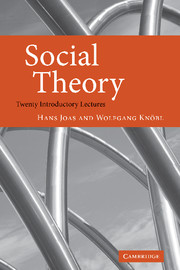Book contents
- Frontmatter
- Dedication
- Contents
- Introduction
- I What is theory?
- II The classical attempt at synthesis: Talcott Parsons
- III Parsons on the road to normativist functionalism
- IV Parsons and the elaboration of normativist functionalism
- V Neo-utilitarianism
- VI Interpretive approaches (1): symbolic interactionism
- VII Interpretive approaches (2): ethnomethodology
- VIII Conflict sociology and conflict theory
- IX Habermas and critical theory
- X Habermas' ‘theory of communicative action’
- XI Niklas Luhmann's radicalization of functionalism
- XII Anthony Giddens' theory of structuration and the new British sociology of power
- XIII The renewal of Parsonianism and modernization theory
- XIV Structuralism and poststructuralism
- XV Between structuralism and theory of practice: The cultural sociology of Pierre Bourdieu
- XVI French anti-structuralists (Cornelius Castoriadis, Alain Touraine and Paul Ricoeur)
- XVII Feminist social theories
- XVIII A crisis of modernity? New diagnoses (Ulrich Beck, Zygmunt Bauman, Robert Bellah, and the debate between liberals and communitarians)
- XIX Neo-pragmatism
- XX How things stand
- References
- Author index
- Subject index
XX - How things stand
Published online by Cambridge University Press: 05 June 2014
- Frontmatter
- Dedication
- Contents
- Introduction
- I What is theory?
- II The classical attempt at synthesis: Talcott Parsons
- III Parsons on the road to normativist functionalism
- IV Parsons and the elaboration of normativist functionalism
- V Neo-utilitarianism
- VI Interpretive approaches (1): symbolic interactionism
- VII Interpretive approaches (2): ethnomethodology
- VIII Conflict sociology and conflict theory
- IX Habermas and critical theory
- X Habermas' ‘theory of communicative action’
- XI Niklas Luhmann's radicalization of functionalism
- XII Anthony Giddens' theory of structuration and the new British sociology of power
- XIII The renewal of Parsonianism and modernization theory
- XIV Structuralism and poststructuralism
- XV Between structuralism and theory of practice: The cultural sociology of Pierre Bourdieu
- XVI French anti-structuralists (Cornelius Castoriadis, Alain Touraine and Paul Ricoeur)
- XVII Feminist social theories
- XVIII A crisis of modernity? New diagnoses (Ulrich Beck, Zygmunt Bauman, Robert Bellah, and the debate between liberals and communitarians)
- XIX Neo-pragmatism
- XX How things stand
- References
- Author index
- Subject index
Summary
Looking back over Lectures IX–XIX, there can be no doubt that the classical approaches and those schools that evaded integration into the edifice of Parsonian theory were joined by new and promising syntheses in the field of social theory in the 1970s and 1980s. But these were merely additions to the stock of existing approaches. They did not succeed, as their exponents undoubtedly intended, in dominating the field of social theory institutionally rather than merely synthesizing it intellectually. Thus, despite the widespread desire to produce syntheses, it is by no means easy to sum up the current state of social theory. Furthermore, the recent past has seen far-reaching historical changes of a global nature, such as the collapse of the Soviet empire, which it will take some time for social theorists to digest. In this concluding lecture, we therefore wish to avoid creating the impression that there is a straightforward solution to every problem. Rather, we offer you a tableau of the contemporary situation, an overview of the most recent creative trends, intended to help orient you within this confusing field and with respect to your own studies. You should of course keep in mind at all times that these new trends are all in one way or another further developments of the work of the theorists or theoretical schools dealt with in the preceding lectures.
- Type
- Chapter
- Information
- Social TheoryTwenty Introductory Lectures, pp. 529 - 560Publisher: Cambridge University PressPrint publication year: 2009



